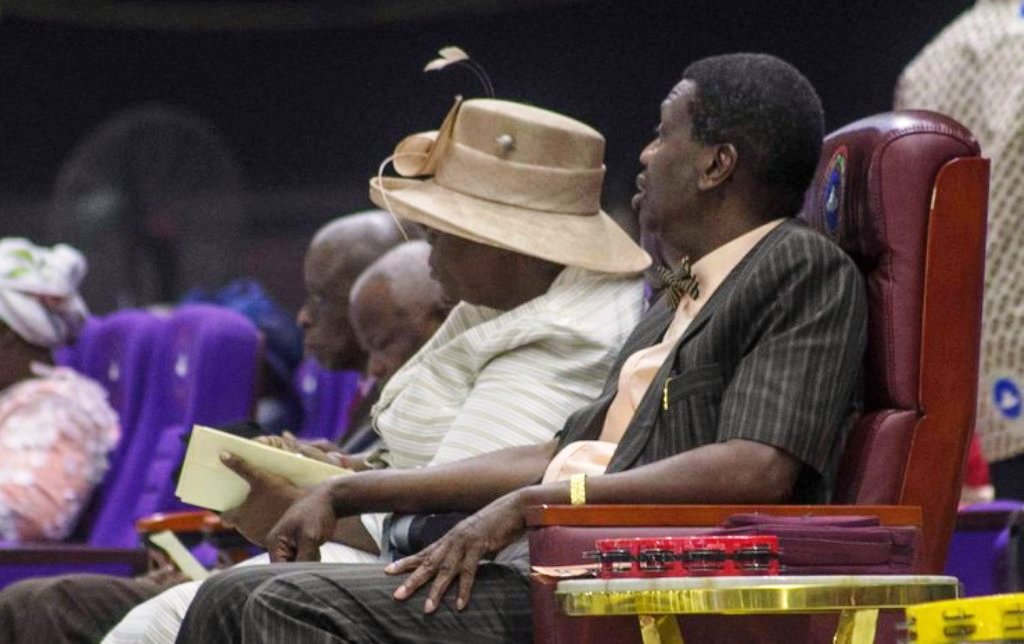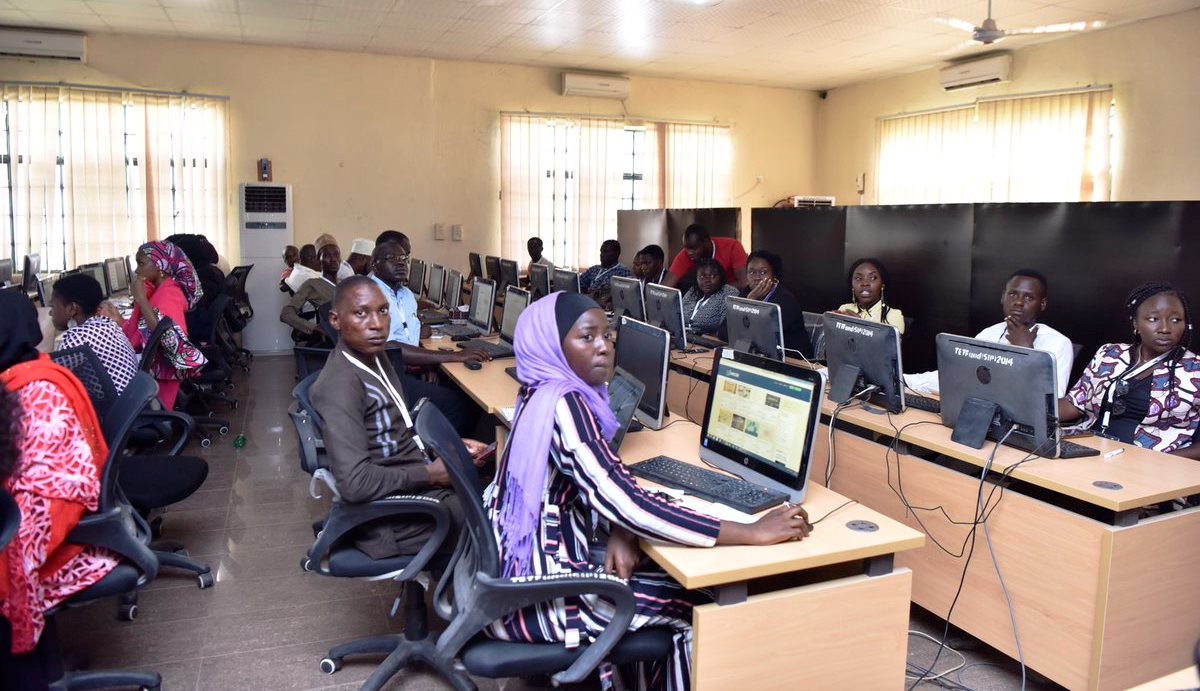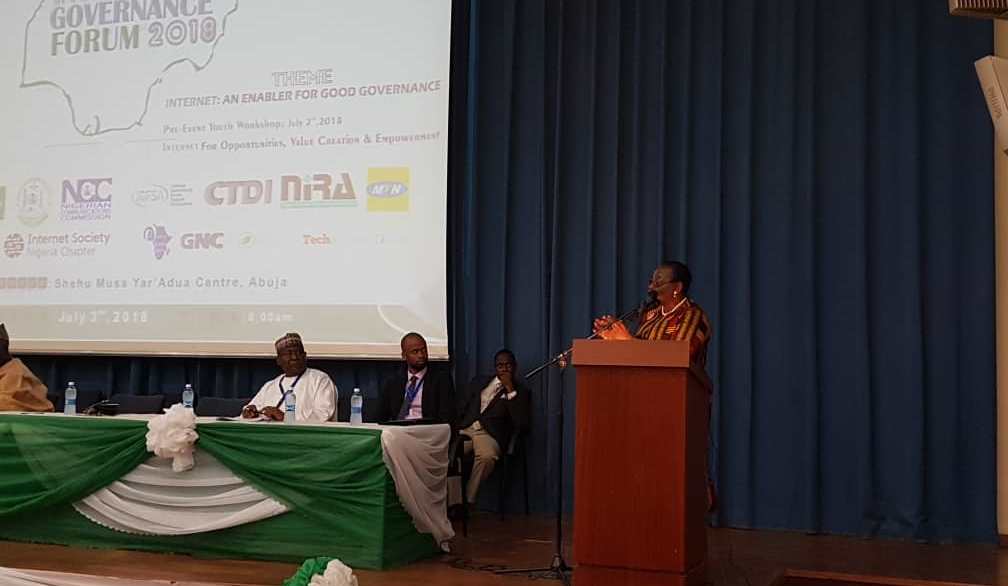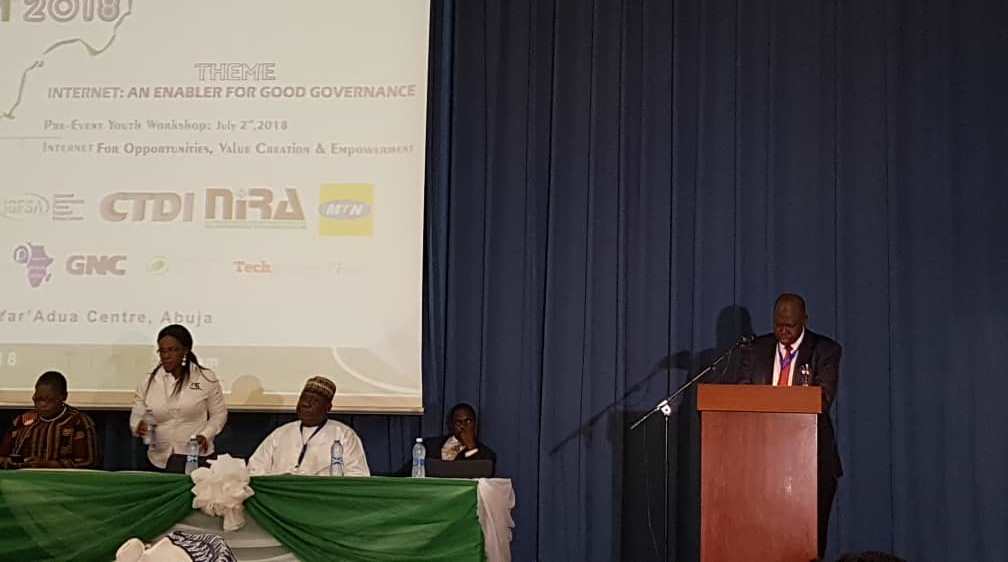Wife of the General Overseer of the Redeemed Christian Church of God (RCCG), Pastor (Mrs) Foluke Adenike Adeboye has charged young adults to seek God first before deciding to marry someone they met on the Internet.
TheNewsGuru (TNG) reports Mrs. Adeboye, who also charged young adults not to marry on credit, made the charge during plenary session themed: “The Indomitable Family” at the ongoing Annual Youth Convention of the RCCG holding at the Redemption Camp.
“Today, people receive their husbands, their wives from the Intenet, from Facebook, from all kinds of gadgets. When it is not of God, it is not good. Whatever is of God is the one that is good. No matter how rossy the qualification of the one we found in the Internet is, if it is not of God, it is of the devil,” she said.
Adeboye, who took her text from Genesis 1 from verse 18 to 26, she said is a very common passage, defined “Indomitable,” one of the keywords in the theme, as “Impossible to subdue” and “impossible to defeat”,
“The family must start from somewhere. Because we are looking for a total youth of tomorrow, who will be adults tomorrow, and who will continue to live a total Christian life. Marriage is good, because God Himself instituted it. There is no way we can just jump over it. God initiated it. Its an instituion He planted by Himself.
“Before a marriage can be impossible to be defeated or be subdued, there must be a foundation for it. Whatever foundation it must be, it must be from the One who initiated it. Which means, the source of every marriage must be from God,” she stated.
The Wife of the General Overseer, advised youths to consult their pastors first on marriage issues before their parents when they decide they want to get married, stressing that this is important so that there is no confusion in the house of God.
“When you attain the age of marriage pray to God for the right choice. There should be no confusion in the house of God. You have to go to your Pastor first to consult for marriage before your parent,” she said.
Adeboye also charged the youths to “Get a job before marriage”, adding: “When you fall out of cash, she falls out of love”.
“The problem we have today is that youths do not want to be accountable. When you live a false life as a youth, when you get married your partner is in trouble,” she further stated.
“Don’t marry on credit, pay your dowry in full,” she charged, while stressing that “Whatever you can afford is what you should do. Cut your coat according to your cloth, not your size”.
Tag: internet
-

Pastor Adeboye speaks on dangers of Internet marriage
-

Why right policies are need to fast-track digital growth in Africa
Prof. Umar Danbatta, Executive Vice Chairman, Nigerian Communications Commission (NCC), has called on stakeholders in the telecommunication sector to put in place right polices to fast track digital growth in Africa.
Danbatta made this call on Monday at the International Telecommunication Union (ITU) and the Digital Bridge Institute Regional Human Capacity Building Workshop in Abuja.
The three days’ workshop has the theme: “Strengthen Capacity on Internet Governance in Africa.
He said there was need to put in place policies and institutions that will accelerate digital growth in the Africa continent.
“ We need to also examine policies that are in place and change those policies that pertain to internet governance with a view to making them more impactful.
“Policies that we need to put in place to inform internet governance, we need to look at what we can do to fast track blocking of internet access gaps.
“Because unless and until we do so, many of our citizens will continue to live without access to the internet, especially the right kind of internet connectivity, ‘the high speed internet, which is mostly facilitated by broadband infrastructure.
“NCC know how important it is to ensure that network is available, the infrastructure necessary to facilitate access to internet and that is why the country is being divided into seven zones with a licensee each to deploy broadband infrastructure,‘’ he said.
Danbatta said NCC through the Digital Bridge Institute (DBI) funds intervention aimed to provide training particularly to teachers in Nigeria tertiary institutions so that they can leverage the power of ICT to improve content delivery.
He said the training would also enable the teachers to access all relevant materials from the internet.
The NCC boss urged delegates at the workshop to make important suggestions on what can be done to bring about enabling policies and institutions that can transform the entire country as well as the Africa continent digitally.
On his part, Mr Marcelino Tayob, Representative of ITU Regional Office for Africa said the workshop which is an annual event of ITU regional office has the objective of providing a platform to share experiences and interact.
Tayob said the workshop dwells on matter selected for the theme of the year.
He said the annual workshop allows human resource professionals to meet under the guidance of the ITU to discuss and share views.
For 2018, we decided to combine the annual workshop on human capacity building and internet governance training.
“The ITU member states believe that capacity building of ITU members on internet governance is one of priorities to be addressed at this workshop with focus on at least developing countries,‘’ he said.
Earlier in his welcome address, Dr. Ikechukwu Adinde, Administrator DBI, said the workshop was aimed at discussing African concerns about human capacity building.
He said ITU member states have another opportunity to focus discussion on future of skills and knowledge as we seek to change the African Landscape in the digital economy.
“We must take strategy decisions that are implementable during the shortest possible time.
“Africa is endowed with talented and vibrant youth population but high population of them lack the skills and opportunity to participate meaningfully in growing the economy.
“In this context, digital skills is required to become genuine contributors in the present competitive market place, ‘’ Adinde said.
-
Internet: 4bn people to be connected by 2020
By 2020, about 4 billion of the world’s 7.6 billion population will be connected leveraging on advancement in Internet of Things (IoT), according to EcoStruxure, a platform of Schneider Electric.
Mrs. Viviane Mike-Eze, the company’s Marketing Communication Manager, said 30 billion things including businesses and organisations will also be connected, and that the whole essence was to enhance safety, reliability, efficiency and sustainability.
She disclosed this to the News Agency of Nigeria on the sidelines of an IDC Data Centre Roadshow in Lagos.
She said the data centre industry was undergoing profound transformation to support the enormous data volumes and processing demands being generated by IoT.
“This is a strong opportunity for growth in the industry as we need to provide solutions that are able to address this challenge.
“It is specifically relevant for us here in Nigeria now with data residency regulations about to be enforced,” she said.
EcoStruxure, she said, would leverage advancements in IoT mobility, sensing, cloud, analytics and cyber security to ensure innovations and connectivity in organisations.
Internet of Things is the network of physical devices, vehicles, home appliances, and other items embedded with electronics, software, sensors, actuators and connectivity.
It enables these items connect and exchange data, creating opportunities for more direct integration of the physical world into computer-based systems, resulting in efficiency improvements, economic benefits and reduced human exertions.
According to Mike-Eze, to succeed in the industry, businesses have to accelerate their time to market in the design, build phases and reach operational excellence for customer satisfaction.
“They will expand their businesses and keep up with fast growing market; all while reducing energy cost and improving sustainability.
“EcoStruxure architecture has a strong role to play in assisting organisations to address these challenges by leveraging connected products, edge control and analytics to optimise asset performance and drive profitability,” Mike-Eze added.
She disclosed that Google was leveraging its 21st Century Technologies empowerment scheme to establish Google Station and City WiFi in Nigeria.
“21st Century Technologies is a very strong player coming up in the market, the first Nigerian company to set up a Tier 4 design data centre, and it is set to be the biggest on the African continent.
“All the equipment in 21st Century Technologies, from the data management facility to the building management system; their alternative power solutions — all of these are Schneider Electric EcoStruxure Solutions,” said Mike-Eze.
EcoStruxure technology is creating the path for the digital transformation of industries in Nigeria.
-

Be security conscious while using free Wi-Fi, IT expert warns internet users
An Information Technology expert, Mr Jide Awe, on Saturday urged members of the general public to be security conscious while using free Wi-Fi.
Awe, the Conferences Committee Chairman, Nigeria Computer Society (NCS), made the plea in an interview with the News Agency of Nigeria (NAN) in Lagos.
According to him, free Wi-Fi or even Wi-Fi used at home, is prone to be hacked if proper measures are not put in place to safeguard it.
NAN reports that on July 27, Google unveiled Google Station, a programme aimed at providing free high quality, high-speed Wi-Fi hotspots to millions of Nigerians.
The Google Station would be rolling out in 200 locations in five cities across Nigeria by the end of 2019, and was currently located in five areas in Lagos.
“The Google Station is a welcome development in the sense that it will span the availability of broadband and indirectly lead to economic activities and growth.
“We should also understand that anything that has to do with infrastructure providing IT services, one must always think of cyber security.
“Everyone has a role to play to ensure that the services are not easily hacked and for the individual, they should make sure that their workstation is well protected,’’ he said.
Awe urged the public to have good security tools that are regularly updated on their workstations, which could easily block any form of hacking.
He said that the same principles that one would apply when using a Wi-Fi in the house to avoid penetration should also be applied when one was using a free Wi-Fi like the Google Station.
“Getting regular updates and putting an alert can save one’s data because of some social engineering that people also use to hack,’’ he said.
Awe added that not only does the free Wi-Fi pose negative threats, it also has its positive side, like the improved access to internet for people within the environment it was situated.
“When people start using it more and as long as it is sustainable, it will lead to job creation, reduction in cost of data and better access to broadband.
“It will lead to more people being included in the digital revolution that is going on, which will eventually lead to improvement of oneself.
“This access will lead to a multiplier effect in terms of economic growth for the country,’’ he said.
NAN
-
Authorities shut down internet in eastern Ethiopia amid regional violence
Authorities have shut down the Internet in eastern Ethiopia amid an outbreak of violence in the region, a local resident said on Wednesday.
The resident, speaking from the city of Harar, some 100 km from Jijiga, the capital of the region of Somali, said the connection had been off for three days.
Rights group Access Now confirmed the shutdown in a statement.
Violence broke out in Jijiga on Saturday, with mobs looting properties owned by ethnic minorities, in unrest that the government said had been stoked by regional officials at odds with central authorities.
Security forces in Ethiopia’s eastern Somali region on Monday shot dead four people protesting against the looting of their shops and homes.
The attacks forced thousands to seek refuge in an Ethiopian Orthodox church from Friday, residents told Reuters.
On Monday, some of them staged a protest.
“They blocked a road surrounding the church to demonstrate, before security forces arrived and began firing indiscriminately,” one resident of the town told Reuters.
The witness, who declined to be named, said he saw four bodies on the ground after the crowd dispersed. Gunfire rang out throughout the day.
At least two Ethiopian Orthodox churches were also burned down over the weekend, other residents told Reuters.
Amid the violence, the region’s president Abdi Omer stepped down late on Monday, state-owned media outlets said. The agencies did not offer any explanation for his resignation.
But earlier, government spokesman Ahmed Shide had said regional officials were stoking violence at a time when attempts were being made to address rights abuses in the region.
He said the officials claimed the government was illegally forcing them to resign, and that a regional paramilitary force had taken part in the attacks under their orders.
“Infrastructure was destroyed and civilians were subjected to killings and lootings. Religious centres were also attacked and banks looted,” he said at a news conference.
“These acts were carried out by gangs of youths that were organised by some members of the region’s leadership.”
Witnesses told Reuters that soldiers were deployed as early as Friday evening.
But Ahmed said orders were given only on Monday and that they would soon “start operations” to restore calm.
The Somali region has seen sporadic violence for three decades.
The government has fought the rebel Ogaden National Liberation Front since 1984 after the group launched a bid for secession of the province, also known as Ogaden.
Since 2017, clashes along its border with Oromiya province have displaced tens of thousands of people.
In July, the region’s officials were accused by the government in Addis Ababa of perpetrating rights abuses. Last month, authorities fired senior prison officials there over allegations of torture.
The unrest in the province marks a first test for new prime minister Abiy Ahmed, who has pledged transparency and a crackdown on abuses by security services.
-
Nigeria Internet users record decrease
The Nigerian Communications Commission (NCC) says Internet users in the country decreased to 102,805,122 million in June from the 103,152,726 million recorded in May.
The NCC made this disclosure in its Monthly Internet Subscribers Data for June 2018 on its website on in Abuja.
The data showed a decrease 347,604 subscribers in the country.
The data showed a decrease with the figure of 347,604 subscribers in the country.
NCC said Airtel gained more internet subscribers during the month under review, while MTN, 9Mobile and Globalcom were the big losers.
The breakdown revealed that Airtel gained 162,711 new internet users, increasing subscription to its services from 26,548,338 million in May to 26, 711,049 in June.
It said MTN lost 253,612 internet users in June amounting to 38, 937,473 as against 39,191,085 recorded in May.
It said that Globacom also lost 36,187 internet users decreasing its subscription to 26, 571,254 in June from 26,607,441 recorded in May.
It said 9mobile lost 222,516 internet users in June decreasing its subscription to 10,585,346 as against 10,807,862 recorded in May.
-
Sales of answers online: WAEC in dire need of government’s intervention to battle exam malpractices
Issues of examination malpractices in Nigeria, especially those perpetrated via the internet have become a major concern that has troubled stakeholders and defied several correctional approaches put forward by different examination bodies.
In the last concluded 2018 examination organised by the West Africa Examination Council, WAEC, there were several reports that revealed how students in Nigeria were offered answers to test questions hours by several websites and blogs before the exam papers were written.
TheNewsGuru in its findings learnt that some of the websites which offered answers to students in the WAEC April 18, examination are still in full operation and discovered that government’s intervention in the battle against examination malpractices is a key factor that can aid exam bodies in preventing future recurrences.
How expo websites released answers to candidates:
Our investigation showed some of the online portals reportedly gave students the information on how to view answers either receiving the answers as text messages or passwords to specific areas of their websites where full answers are obtained.
In order to lure exam writers to patronise their services, the said domains only leak part of the answers while urging them [candidates] to mail them if interested in the illicit service.
Most of the websites sells answers to theory and Objective questions between N400 and N800.
After payment, candidates, who subscribe to the result peddling websites get the answers to the questions they request delivered to their phones.
These are the five websites that have allegedly been exposed in the exam malpractice scandal.
One of the expo websites, http://examsort.com/, prides itself as the number one exam runs platform that sells answers to exam questions in exchange for recharge cards we discovered .
During the exam period another, www.codedclass.com, shared info with examination candidates on their fraudulent acts.
The information reads: “Special package! Maths Runs. Subscribe for maths early to get registered early. Good News: tell you friends that www.codedclass.com have (sic) mathematics answers and will be posted sent by 11-12am Wednesday midnight. Mathematics questions are now ready!
“Ensure you subscribe to get it before time. Direct=N1,000 MTN card; Password=N500 MTN card. Forward the card, your name, your subject to 090xxxxxxx. Transfer is allowed. Please don’t call just; send your details because the number might be switched off/divert due to too much calls.”
Other websites advertising answers include morebaze.com, humbleloaded.com.ng and coadedclass.com, examcrown.com
We need government intervention to fully prevent exam malpractices – WAEC
The Public Affairs officer of WAEC, Mr. Demianus Ojijeogu, told TheNewsguru that the council doesn’t have the staff strength that can follow all the supervisors from its custodial centres to the exam halls but highlighted measures put in place measures to forestall leakage of exam papers.
His words, “We were on those websites too [expo sites], the council sponsored some people to register and be on the sites to monitor and see what is going on, we subscribed and paid and what we observed is that after the examination has commenced the questions were snapped and forwarded to mercenaries to solve the questions.
“We traced the numbers of questions papers that were captured in the pictures to some centers outside Lagos, our intention is to make arrest, however, when we discovered that those who sent the exam questions were not candidates so we couldn’t make any headway.
He said the council discovered afterwards that some supervisors, principals were culpable in the process while stressing that the council did its own best to ensure there were no actual leakages.
“Some people were carrying fake WAEC Identification cards and moving from across different examination centres, gain access and snap the question papers, and in other cases supervisors, principals were culpable- we even had to change question papers in some critical case
If we have succeeded in ensuring that no insider in our council leaked the questions how do we prevent the supervisors who come to carry the question papers in the morning? So, this is a major weak link in the whole chain” He added
Speaking on how the sales of answers online can be prevented in the future, Ojijeogu said intervention of government via means of executive orders or legislation is one of the potent way forward for the exam body.
He said, “The future of this battle against malpractices on online space is through active government participation. For instance, in Algeria the government had to shut down internet in areas where exam are being conducted for about an hour. If a candidate then manages to smuggle phone into the examination hall and there are no internet access in such premises, then candidates will be forced to go back to reading.
We are working round the clock to ensure we prevent this menace, the council has reported the case to State Criminal Investigation and Intelligent Department (SCIID), Panti in Lagos and the police have commenced thorough investigations, we are also beaming the searchlight on ourselves” He ended
-

Kenya to use Alphabet’s balloons for rural internet
Kenya will use Alphabet Inc’s system of balloons to beam high-speed internet access in hopes of connecting more of its rural population to the web, its ICT Minister said on Thursday.
Known as “Project Loon”, the technology was developed by Alphabet’s X, the company’s innovation lab.
It was used by U.S. telecom operators to provide connectivity to more than 250,000 people in Puerto Rico after a hurricane last year.
Joe Mucheru, the Information, Communication and Technology Minister, told the media on Wednesday that project representatives were holding talks with local telecom operators.
“The Loon team are still working out contracts and hopefully, once that is done, we can be able to see almost every part of the country covered,’’ he said.
The project confirmed it was holding talks locally but it did not give details.
“We are always in discussions with governments and telcos around the world,” said a Project Loon spokesperson in London.
With more than 45 million people, Kenya’s major cities and towns are covered by operator networks, but vast swathes of rural Kenya are not covered.
A Microsoft backed Kenyan start-up has been using under-utilised television frequencies to connect some of those rural communities.
“Loon is another technology that is being introduced that the licensed operators hopefully can be able to use,’’ Mucheru said, adding it would help the government meet its goal of reaching everyone.
“Connectivity is critical. If you are not online, you are left out.’’
-

Good governance: How Internet is greatest tool – Ezekwesili
Dr Oby Ezekwesili, the Senior Economic Advisor, Africa Economic Development Policy Initiative (AEDPI) says internet has become the greatest tool for citizens’ participation in good governance.
Ezekwesili, former Education Minister, said this at the Nigeria Internet Governance Forum 2018 with the theme: “Internet; An Enabler for Good Governance’’ in Abuja on Tuesday.
She was speaking on the topic: “Internet as an Enabler of Accountability and Transparency’’.
According to her, governance exists to improve the quality of life and ensure safety and security, using the instrumentality of strong policies with strong and dynamic institutions to promote growth and development.
“Without quality governance, it is impossible for a country to develop; the internet is an equaliser and a means of improving capacity.
“It is a tool to use to create the bases for wider participation, engage voices, demand for accountability and define how quickly we get to good governance.
“As growth and development happens societies become stable and prosperous, the prosperity of society further thrives because as society grows, the citizens grow and this creates a basis for social cohesion.’’
She said the internet had destroyed the barrier of geography and distance that made communication and participation in governance impossible.
She explained that people could be in the remotest areas in Nigeria and still be able to interact with the people in the Diaspora.
“The internet has come to disrupt the monopoly of bad governance, and so the main issue is going to be getting the citizens to a place of information literacy.
“Just getting the citizens to a place you have a right to know, you not only have a right to know, you have a voice to demand and the power to determine the quality of governance that is given to you.’’
She, therefore, urged youths to focus on knowledge-based technology to improve their society instead of commercial-oriented schemes to enrich themselves which would not result in good governance.
Mr Gbenga Sesan, the Executive Officer of Paradigm Initiative an NGO said that Nigeria would never move forward economically or otherwise if it kept talking down on the youth instead of providing opportunities for them.
“Nigeria can do a lot better as far as the internet is concerned; when we talk of internet governance, one of the key elements is digital rights.
“We need to make sure that every young person who is a citizen of this country is pushed toward being creative so that instead of arresting people for the things they tweet, we can focus on the opportunities the internet presents,’’ he said.
-

NCC says Internet users reaches 103m in May
Prof. Umar Danbatta, the Executive Vice Chairman, Nigerian Communications Commission (NCC) on Tuesday described the growth of the internet as enormous with the number of users reaching 103 million in May.
Danbatta, who was represented by Mr Haru Alhassan, the Director, New Media and Information Security of NCC, said this in Abuja at the Nigeria Internet Governance Forum (NIGF) 2018.
The forum’s theme is: “Internet: An Enabler for Good Governance’’.
He said that this was an impressive growth from 28 million internet users recorded in 2012.
“This evolution shows the importance of harnessing the benefit of internet for good governance.
“This figure of the internet subscribers’ data highlights the importance and the value of internet,’’ he said
Danbatta said that the commission would also license three additional Infrastructure Company (INFRACOs), bringing the number to seven to boost broadband penetration in the country.
He said the three INFRACOs were awaiting approval as the commission had earlier licensed two infrastructure companies earlier in the year to lay the foundation for internet penetration and increased broadband services.
The two INFRACOs are Zinox Technology Ltd. for Southeast and Brinks Integrated Solutions Ltd. for Northeast.
“The licenses are based on NCC open licensed model which is in line with the National Broadband plan 2013 to 2018,’’ he said.
Over a year ago, Mainone Cable company had been licensed to provide services in Lagos, while HIS got its license to cover the North Central Geopolitical Zone including Abuja.
“This event is very important in bringing various stakeholders to discuss issues of internet governance, ‘’ Danbatta said.
Prof. Muhammad Mainnima, the Vice Chancellor of Nasarawa State University Keffi said the theme of forum was apt and worthy of participation as Nigeria was approaching the 2019 general elections.
Mainnima, represented by Prof. Grace Pennap, the Deputy Vice Chancellor of the university said Information Communication Technology (ICT) would have significant role to play in the elections.
“While we agree that internet can promote good governance, it is important to think of how to make Nigeria cyberspace safe and secured.
“Therefore, it is my sincere hope that this year’s conference will add value positively to the narratives of good governance powered by the internet,’’ he said.
Earlier, Mrs Mary Uduma, the Chair, NIGF Multi-Stakeholders Advisory Group said NIGF was the local initiative of the UN Internet Governance that was agreed on by the world in 2005.
According to Uduma, NGIF is a stakeholders platform that discuss public policy issues pertaining to internet such as internet security, good governance.
“We have brought internet experts to dissect this along the line of global discussion in areas of access inclusiveness and diversity, cyber security and trust.